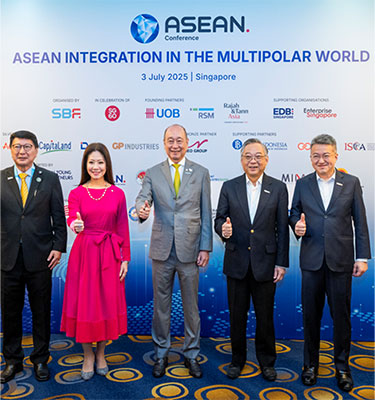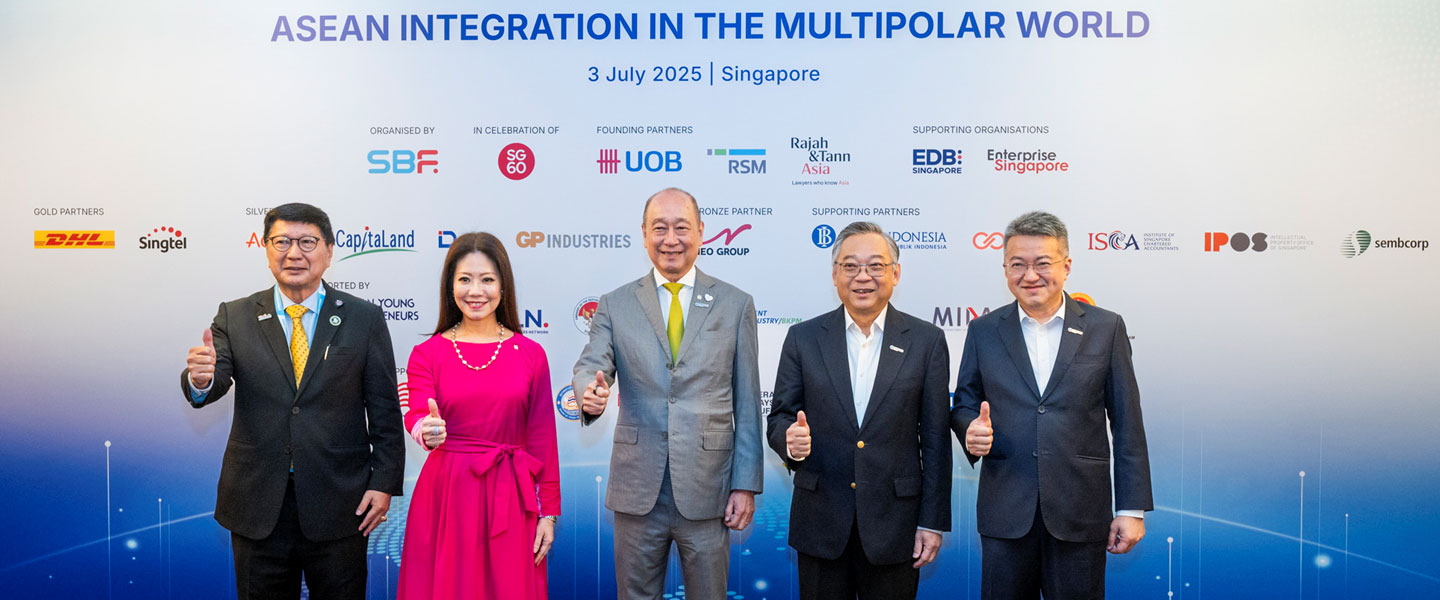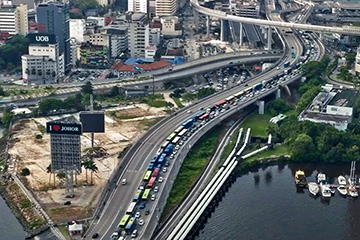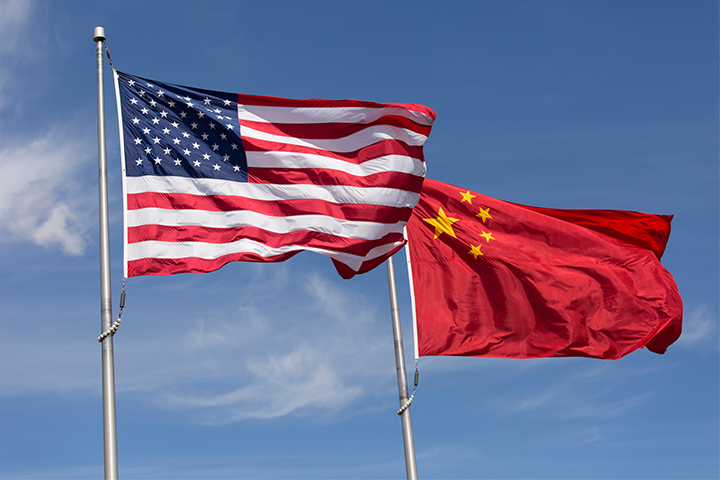You are now reading:
ASEAN Conference 2025: Regional Integration in a Multipolar World

Find out how we can help you fast-track your investments in the JS-SEZ.
Learn moreyou are in UOB ASEAN Insights


You are now reading:
ASEAN Conference 2025: Regional Integration in a Multipolar World
ASEAN member countries are stepping up efforts to strengthen regional integration against a global backdrop of geopolitical tension and trade uncertainties.
This was the overarching theme at the ASEAN Conference 2025, held in Singapore and organised by the Singapore Business Federation (SBF) in partnership with founding partners UOB, RSM, and Rajah & Tann. The event brought together policymakers from across Southeast Asia together with 600 senior business executives from over 20 countries, fostering dialogue on intra-ASEAN collaboration.
At the conference, speakers made an increasingly compelling case for deeper intra-ASEAN economic integration.
Global trade tensions have affected a range of businesses in Southeast Asia in a range of industries from semiconductors and high-tech manufacturing to textiles and agriculture.
Rising economic nationalism has also seen greater import/export controls and reshoring in response to global supply chain disruptions.
These factors bolster a strong business case for a relatively stable economic bloc within Southeast Asia to absorb potential capital and business opportunities.
While ASEAN’s cooperative spirit has helped the region weather past crises, it is becoming increasingly important to navigate future uncertainties.
Working towards collective growth calls for a re-visit of the region’s long-term policy direction and a collaborative developmental model that involves both government and business leaders.
The idea of a coordinated ASEAN industrial policy was brought up at the ministerial dialogue where policymakers from Singapore, Malaysia and Indonesia exchanged ideas on “ASEAN Integration in the Multipolar World”.
This proposed industrial policy will provide a framework for innovation, upskilling, and strategic investment in key sectors.

Participants in the Ministerial Dialogue (from left to right): Mr Kok Ping Soon, CEO, Singapore Business Federation, Mr Gan Kim Yong, Deputy Prime Minister and Minister for Trade and Industry, Singapore; YB Liew Chin Tong, Deputy Minister of Investment, Trade and Industry, Malaysia; Professor Dr. Tirta Nugraha Mursitama, Deputy Minister for Investment Cooperation, Minister of Investment and Downstream Industry, Indonesia; and Mr Kok Ping Soon, CEO, Singapore Business Federation.
This entails greater policy harmonisation and reduced non-tariff barriers that currently hinder seamless cross-border commerce when doing business in Southeast Asia.
Measures proposed include introducing passport-free travel within ASEAN, streamlining customs procedures, and enhancing regulatory transparency.
At the same time, companies in Southeast Asia are encouraged to move beyond a passive “wait-and-see” mindset and play a more active role.
The private sector was called to leverage free trade agreements (FTAs), cross-border digital platforms, and regional investment initiatives to expand beyond the home ground.
According to Kok Ping Soon, CEO, Singapore Business Federation and moderator for the ministerial dialogue, structural diversity within the region is not a weakness, but a strength. Shared strengths – particularly in manufacturing and innovation – are already shaping a blueprint for stronger intra-ASEAN trade and industrial growth.
Although still in its early days, the ASEAN narrative has gone beyond decoupling to embracing an interconnected, multilocal supply chain network. This strategy acknowledges the individual strengths of member countries for shared prosperity.
The panellists at the panel discussion “ASEAN’s Challenges and Opportunities in a New World Order” acknowledged that ASEAN can collectively compete globally across a broad range of complementary capabilities and become a source of innovation, technology and leadership.
An ASEAN-centric business ecosystem would enable companies to link capital, suppliers and customers seamlessly to create and capture economic opportunities.
Trilateral partnerships such as SIJORI (Singapore-Johor-Riau) are back on the drawing board but private sector champions are integral to this process.
UOB, for example, has spent the past decade in setting up a dedicated FDI Advisory unit to assist companies in their internationalisation journey into ASEAN. Since its establishment in 2011, the unit has supported over 5,000 companies and enabled the creation of 250,000 jobs in the region.
Frederick Chin, Head Group Wholesale Banking and Markets, UOB shared that the current geopolitical conditions are testing intra-ASEAN trade policies and will help build immune systems to cope with future global trade shocks.
In the same panel discussion, Arthur Lang, Group CFO of Singtel, singled out the company’s data centres in Johor as an example of how private-public and multilocal partnerships can work out in practice.
ASEAN’s collective future may hinge on its ability to harness emerging technologies and embrace sustainability.
Mr. Wee Ee Cheong, Deputy Chairman and CEO of UOB highlighted the role of ESG and AI in shaping the region’s policy and business agendas. The relatively unchartered territory of these areas offers a greenfield that can help define a distinct ASEAN economic identity.
“AI and ESG are now central to government and business strategies. These shifts are creating strong opportunities for public-private partnerships to build future-ready infrastructure,” he said.

There are already existing coordinated efforts in areas such as cross-border QR payments and building harmonised sustainability frameworks.
At the same time, crafting regional guidelines on AI governance and digital trust can help lay strong foundations for future regional cooperation.
Despite different economic strengths among the member states, ASEAN’s diversity is a source of resilience.
However, this means that local insight and long-term relationships are important. Chin shared that sector specialisation has been valuable for UOB’s FDI Advisory Unit given the diverse industries and development stages across the region.
The region is well-positioned to thrive in a multipolar world when aligned on strategic economic and business priorities.
ASEAN stands at a pivotal moment. Governments and businesses in Southeast Asia can look forward to charting a new course defined by close collaboration and regional self-determination.

At the event, UOB signed five Memorandum of Understanding (MOU) with government agencies and industry partners, as a strategic partnership to strengthen sector collaboration and facilitation of cross-border investments in the ASEAN and Greater China region.
UOB signed five MOUs at ASEAN Conference with government agencies and regional industry partners

18 Jul 2025 • 78 mins watch

16 Jul 2025 • 5 mins read

02 May 2025 • 4 mins read